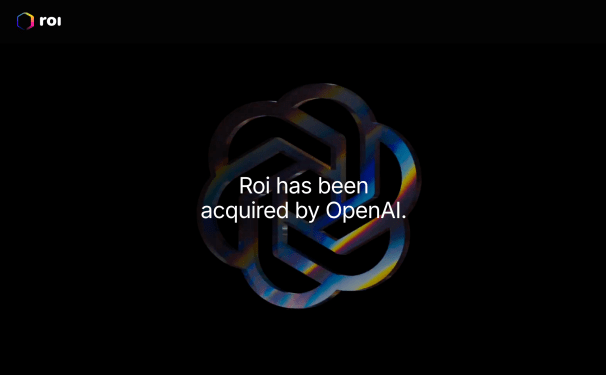OpenAI has acquired Roi, an AI-powered personal finance app. In a recent industry trend, only the company’s CEO is making the transition. Chief executive and co-founder Sujith Vishwajith announced the acquisition, and a source familiar with the matter confirmed he is the only one of Roi’s four-person staff joining OpenAI. The terms of the deal were not disclosed. The company will wind down operations and end its service to customers on October 15.
The Roi deal marks the latest in a string of acqui-hires from OpenAI this year, which have included the teams behind Context.ai, Crossing Minds, and Alex. While it is not clear whether any of Roi’s technology will transfer to OpenAI or which unit Vishwajith will join, the acquisition clearly aligns with OpenAI’s focus on personalization and life management as the next layer of AI products. Roi brings a specialized team that has already worked on solving personalization in finance at scale, a challenge with lessons that can be applied more broadly.
New York-based Roi was founded in 2022 and raised $3.6 million in early-stage funding from investors such as Balaji Srinivasan, Spark Capital, Gradient Ventures, and Spacecadet Ventures, according to PitchBook data. Its mission was to aggregate a user’s financial footprint, including stocks, crypto, DeFi, real estate, and NFTs, into a single app that could track funds, provide insights, and help people make trades.
In a post, Vishwajith wrote that the company started Roi three years ago to make investing accessible by building the most personalized financial experience. He stated that along the way they realized personalization is not just the future of finance, but the future of software.
Beyond tracking trades, Roi provided users with a financially savvy AI companion that responded in personalized ways. During sign-up, users could customize Roi by providing information such as their occupation and how they preferred the app to communicate with them.
In one example, a sample user requested to be spoken to like a Gen-Z kid with brain rot, using as few words as possible and including roasts. In response to a portfolio status query, Roi replied in a very casual and personalized tone, highlighting losses and suggesting potential actions based on risk preference. This exchange illustrates the philosophy behind Roi and its co-founder, that software should adapt, learn, and communicate in ways that feel personal and human to keep users engaged.
As the Roi team wrote in a blog post, the products we use every day will not remain static experiences but will become adaptive companions that understand and evolve with us. This vision aligns with OpenAI’s existing consumer efforts, including Pulse, which generates personalized news reports, the Sora app, a TikTok competitor with AI-generated content, and Instant Checkout, a feature for making purchases directly within ChatGPT.
The deal also comes as OpenAI strengthens its consumer applications team, led by former Instacart CEO Fidji Simo. This is a further signal that OpenAI is not just aiming to be an API provider, but wants to build its own end-user applications. Roi’s talent and technology could integrate into these apps to make them more adaptive.
Vishwajith, alongside his co-founder Chip Davis, previously worked at Airbnb, where he developed skills in optimizing user behavior to drive revenue. By his own account, a simple change involving 25 lines of code led to over ten million dollars in additional cash. Generating meaningful revenue through consumer apps is increasingly important for OpenAI as it continues significant spending on data centers and infrastructure to power its models.

